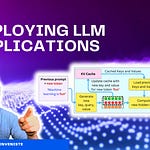The Different Machine Learning Jobs
Transitioning to a Machine Learning job
What hiring managers care about on the resume
Defining the type of engineer you are
Structuring your resume
Where can you get a job in machine learning
Preparing for interviews
The Different Machine Learning Jobs
There are many jobs where you can work in Machine Learning. Let’s look at a few of them:
ML engineer:
Responsibilities: Design and implement machine learning applications and systems. This involves creating algorithms, experimenting with models, and deploying ML solutions into production environments.
Skills: Python, ML frameworks (TensorFlow, PyTorch, Scikit-learn), model deployment.
Education: Bachelor’s, Master’s and PhD preferred
Data Scientist:
Responsibilities: Analyze and interpret complex data to help make informed decisions. This includes predictive modeling, statistical analysis, and using machine learning to extract insights from data.
Skills: Strong background in statistics, programming (Python, R), data visualization tools (Tableau, PowerBI), and ML libraries.
Education: Bachelor’s, Master’s and PhD preferred
AI/ML Product Manager:
Responsibilities: Oversee the development and strategy of AI/ML-based products. This involves coordinating between the technical team and other departments, understanding market needs, and setting product vision.
Skills: Strong technical background, understanding of AI/ML technologies, excellent project management skills, and the ability to translate complex concepts for non-technical stakeholders.
Education: Bachelor's degree in engineering. MBA can beneficial
Managing ML Teams:
Responsibilities: Lead and coordinate multidisciplinary ML teams to develop and implement machine learning solutions that align with business goals. This includes project management, setting strategic direction, facilitating collaboration across departments, and ensuring projects are delivered on time and within budget.
Skills: Leadership and team management, foundational knowledge of AI/ML technologies, strong project management and communication skills, and the ability to bridge technical and business perspectives.
Education: Bachelor’s degree in Computer Science, Data Science, or a related field. An advanced degree or MBA is advantageous.
Research Scientist:
Responsibilities: Conduct advanced research to develop new machine learning techniques and algorithms. This role often focuses on pushing the boundaries of AI and ML through experimentation and innovation.
Skills: Deep understanding of machine learning, neural networks, and computational statistics. Publication record in peer-reviewed journals or conferences is often required.
Education: Ph.D. in Computer Science, Machine Learning, Statistics, or a related field is highly preferred. A Master's degree may be acceptable with significant relevant experience.
Robotics Engineer:
Responsibilities: Design and build robots that use machine learning to perform tasks autonomously. This role combines aspects of mechanical, electrical, and software engineering.
Skills: Knowledge of robotics software and hardware, programming skills (C++, Python), and experience with machine learning algorithms for robotics.
Education: Bachelor’s or Master’s degree in Robotics, Mechanical Engineering, Electrical Engineering, Computer Science, or a related field. Advanced degrees are often preferred for more complex or research-focused roles.
Computer Vision Engineer:
Responsibilities: Develop applications and systems that can process, analyze, and make decisions based on visual data. Uses include facial recognition, image classification, and autonomous vehicles.
Skills: Experience with computer vision libraries (OpenCV, TensorFlow Vision), understanding of image processing algorithms, and machine learning model development.
Education: Bachelor's degree in Computer Science, Electrical Engineering, Robotics, or a related field, with a focus on computer vision or image processing. A Master’s degree or Ph.D. is often preferred for roles involving advanced research or specialized applications.
NLP Engineer (ML engineering focused):
Responsibilities: Specialize in training or customizing pre-trained NLP models. This involves data preprocessing, model fine-tuning, evaluation, and deployment of models to production environments.
Skills: Python, NLTK, spaCy, TensorFlow, or PyTorch, especially for model fine-tuning.
Model Deployment. Skills in text cleaning, tokenization, and vectorization. Understanding of NLP-specific ML models.
Education: Bachelor’s, Master’s and PhD preferred












